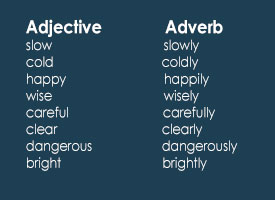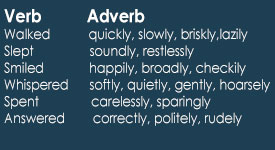Adverbs are words that modify or add meaning to the verb they qualify.
Example:
Margaret ate her food noisily.
In this example, noisily acts as an adverb. It adds meaning to the verb ate and tells us how the food was eaten.
Adverbs also add to the meaning of adjectives and other adverbs too.
Instead of the expression "adding to the meaning of", we shall use the grammatical term modify. So an adverb modifies verbs, adjectives and other adverbs.
Some adverbs are formed from adjectives just by adding /-ly/.

Some adverbs have the same form as adjectives.

Adverbs are not the only ones which form words ending /-ly/. Some adjectives also end in the same way:

Some common words ending in /-ly/ are both adjectives and adverbs:

Adverbs are grouped according to:
1. The manner in which something is done. (How?)
2. The time at which something happens. (When?)
3. The frequency with which something happens (How often?).
4. The place at which or the direction in which something happens (Where?).
5. The extent or degree to which something happens. (How much?)
This way of looking at adverbs will therefore give us adverbs of manner, time, frequency, place or direction and of degree.
quickly, slowly, fast, angrily, carefully, etc
Last week, yesterday, tomorrow, soon, an hour, etc
Often, always, frequently, generally, usually, sometimes, never, ever, rarely, seldom, occasionally, weekly, fortnightly, monthly, annually, hardly, etc
In , out, here, there, upstairs, etc
Entirely, wholly, fully, thoroughly, etc
Verbs and adverbs are often matched in the following way. The verbs in the examples are in the past tense:
